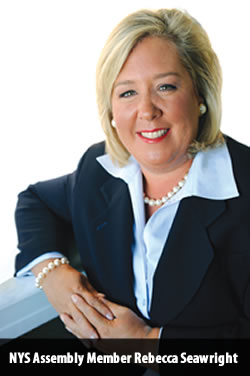WOMEN SHAPING HISTORY 2017
Rebecca A. Seawright, NYS Assembley:
The Long Battle for Women’s Rights
 In the last Education Update, I wrote about the uncertainty on what the future holds for our country’s education system when it comes to education policies, funding and the support needed to ensure that our nation remains competitive. Federal funding and support for public and higher education is the lifeblood of our democracy that supplements the ongoing responsibilities of individual states. At the same time, we spent much of the month of February in Albany analyzing the Governor’s 2017/18 State budget. As a Member of the Assembly Education Committee, I will continue to advocate for increased support and resources for our public schools and higher education institutions.
In the last Education Update, I wrote about the uncertainty on what the future holds for our country’s education system when it comes to education policies, funding and the support needed to ensure that our nation remains competitive. Federal funding and support for public and higher education is the lifeblood of our democracy that supplements the ongoing responsibilities of individual states. At the same time, we spent much of the month of February in Albany analyzing the Governor’s 2017/18 State budget. As a Member of the Assembly Education Committee, I will continue to advocate for increased support and resources for our public schools and higher education institutions.
As we enter the month of March – Women’s History Month - we must take a moment to commemorate this monumental period that we are in. This year marks a hundred years since the Women’s Suffrage movement. In a way, it is also an end of an era due to the death of the plaintiff in the Roe v. Wade, a Supreme Court case that put women’s reproductive rights on the national stage.
New York State has played its part in the movement for equal rights, hosting the first Women’s Rights Convention organized by Elizabeth Cady Stanton and Susan B. Anthony in Seneca Falls in 1848. We have fought for a woman’s right to participate equally in a society, to be protected from discrimination and to make her own health care decisions. On January 17, 2017 I voted for and helped pass in the Assembly the Reproductive Health Act that prohibits New York State from denying a woman’s right to obtain an abortion, and the Comprehensive Contraceptive Coverage Act that requires insurers to continue covering contraception at no cost to the consumer.
Despite all the progress we have made as a nation, there are simply too many women who are denied the ability to make decisions about their own body and reproductive health today. Currently, ten states (AL, AZ, AR, DE, LA, MA, MS, NM, OK and WV) have unconstitutional criminal bans on abortion that would go into effect if Roe v. Wade were overturned. Louisiana, Mississippi, North Dakota and South Dakota went even as far as to pass laws that would implement criminal bans on abortion. In 2016 alone, 14 states passed new laws restricting a women’s right to an abortion and in 2017, there have already been dozens anti-choice bills introduced or pending in state legislatures across the country. Women continue to fight, pushing back against attacks on their reproductive health rights and the right to choose. The Women’s March on January 21, 2017 entered the history books of our nation as millions of women and men marched together for freedom and equality. This is the introduction to the next chapter of our struggle for social and economic justice.
The fight for reproductive health rights is merely the tip of the iceberg in the movement for gender equality. According to the U.S. Joint Economic Committee Gender Pay Inequity Report released by Congresswoman Carolyn B. Maloney in 2016, U.S. women face a 21 percent gender pay gap and lose nearly half a million dollars over a 40-year career, earning 79 cents for every dollar a man earns. I am a proud sponsor of the Equal Rights Amendment Resolution in the New York State Assembly that calls for all members of the U.S. Senate and House of Representatives in the 115th Congress to co-sponsor, support, and pass into law the ratification of the Equal Rights Amendment into the Constitution. As my mentor, Roe v. Wade attorney, Sarah Weddington once said, “It is time to renew the battle for reproductive rights. We have been outmaneuvered, outspent, outpostured, and outvoted by a group of single-issue activists. It has taken them nearly two decades to turn back the principles of Roe. Let’s make sure it takes us a shorter time to replace protection for reproductive choice.” It is up to our State to stand up and be a leader in this movement.
Rebecca A. Seawright is Assemblywoman of District 76 in Manhattan. She is also an attorney who worked on the groundbreaking Roe v. Wade case. #
